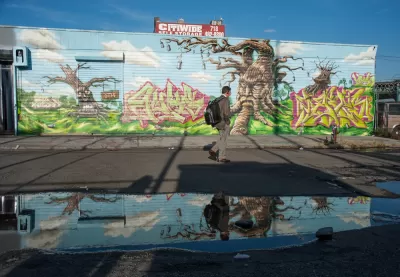Let the debate ensue about the accuracy (not to mention the appropriateness) of the "Gentrifier Calculator" exercise.

"Have you ever found yourself eating a maple bacon donut on a Citi Bike en route to Whole Foods after an exhausting yoga session and wondering: Am I a gentrifier?"
So begins a possibly, somewhat tongue-in-cheek article by Chris Kirk for Slate that promotes a "Gentrifier Calculator." According to Kirk's definition, "Gentrifiers are people with medium or high incomes moving into low-income neighborhoods, attracting new business but raising rents, and often contributing to tensions between new and long-term residents."
The calculator, which runs the numbers on your (yes, you) income compared to median income for your zip code and the median income of your metropolitan area. While it calculates, the screen ponders, "Opening a wine bar," "chasing a taco truck," and "having brunch."
On a more serious note, the post notes that there is no universally accepted definition of gentrification, but called on Ingrid Gould Ellen, a professor of public policy and urban planning at New York University, in finding the formula for the calculator. "For the purposes of this calculator," explains Kirk, "Ellen suggested this formula: If your neighborhood’s median income is lower than the median income of your city, and your income is higher than your city’s median, you’re a gentrifier."
FULL STORY: Are You a Gentrifier?

Alabama: Trump Terminates Settlements for Black Communities Harmed By Raw Sewage
Trump deemed the landmark civil rights agreement “illegal DEI and environmental justice policy.”

Planetizen Federal Action Tracker
A weekly monitor of how Trump’s orders and actions are impacting planners and planning in America.

The 120 Year Old Tiny Home Villages That Sheltered San Francisco’s Earthquake Refugees
More than a century ago, San Francisco mobilized to house thousands of residents displaced by the 1906 earthquake. Could their strategy offer a model for the present?

Opinion: California’s SB 79 Would Improve Housing Affordability and Transit Access
A proposed bill would legalize transit-oriented development statewide.

Record Temperatures Prompt Push for Environmental Justice Bills
Nevada legislators are proposing laws that would mandate heat mitigation measures to protect residents from the impacts of extreme heat.

Downtown Pittsburgh Set to Gain 1,300 New Housing Units
Pittsburgh’s office buildings, many of which date back to the early 20th century, are prime candidates for conversion to housing.
Urban Design for Planners 1: Software Tools
This six-course series explores essential urban design concepts using open source software and equips planners with the tools they need to participate fully in the urban design process.
Planning for Universal Design
Learn the tools for implementing Universal Design in planning regulations.
Clanton & Associates, Inc.
Jessamine County Fiscal Court
Institute for Housing and Urban Development Studies (IHS)
City of Grandview
Harvard GSD Executive Education
Toledo-Lucas County Plan Commissions
Salt Lake City
NYU Wagner Graduate School of Public Service





























